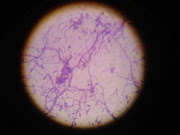CDC
Bioterrorism Agents
|
Category A
|
|
|
|
·
Anthrax
(Bacillus anthracis)
|
|
|
·
Botulism
(Clostridium botulinum toxin)
|
|
|
·
Plague
(Yersinia pestis)
|
|
|
·
Smallpox (Variola
major)
|
|
|
·
Tularemia (Francisella tularensis)
|
|
|
·
Viral hemorrhagic fevers (filoviruses
[e.g., Ebola, Marburg] and
|
|
|
arenaviruses
[e.g., Lassa, Machupo])
|
|
Category B
|
|
|
|
·
Brucellosis
(Brucella species)
|
|
|
·
Epsilon
toxin of Clostridium perfringens
|
|
|
·
Food
safety threats (e.g., Salmonella species, Escherichia coli
O157:H7,
|
|
|
·
Shigella)
|
|
|
·
Glanders
(Burkholderia mallei)
|
|
|
·
Melioidosis (Burkholderia pseudomallei)
|
|
|
·
Psittacosis
(Chlamydia psittaci)
|
|
|
·
Q
fever (Coxiella burnetii)
|
|
|
·
Ricin
toxin from Ricinus
communis (castor beans)
|
|
|
·
Staphylococcal enterotoxin B
|
|
|
·
Typhus
fever (Rickettsia prowazekii)
|
|
|
·
Viral
encephalitis (alphaviruses [e.g., Venezuelan equine encephalitis,
|
|
|
eastern
equine encephalitis, western
equine encephalitis])
|
|
|
·
Water
safety threats (e.g., Vibrio
cholerae, Cryptosporidium parvum)
|
Category C
·
Emerging
infectious diseases such as Nipah virus
and hantavirus
Category A Diseases/Agents
The U.S. public health system
and primary healthcare providers must be prepared
to address various biological agents, including pathogens that are rarely seen in the United
States. High-priority agents include organisms
that pose a risk to national security
because they
·
can be easily disseminated or transmitted from person to person;
·
result in high mortality
rates and have the potential for major public health
impact;
·
might cause public panic and social disruption; and
·
require special action
for public health
preparedness.
Category
B Diseases/Agents
Second highest priority agents include
those that
·
are moderately easy to disseminate;
·
result in moderate morbidity rates and low mortality
rates; and
·
require specific enhancements of CDC's diagnostic capacity
and enhanced disease
surveillance.
Category
C Diseases/Agents
Third highest priority agents include
emerging pathogens
that could be engineered for mass dissemination in the future because
of
·
availability;
·
ease of production and dissemination; and
·
potential for high morbidity
and mortality rates and major health impact.
Citation: CDC
| Bioterrorism Agents/Diseases
(by
Category) | Emergency
Preparedness & Response (http://www.bt.cdc.gov/agent/agentlist-category.asp)






















0 comments:
Post a Comment